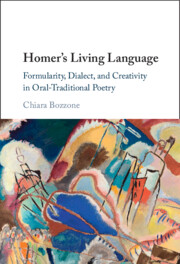Book contents
- Homer’s Living Language
- Homer’s Living Language
- Copyright page
- Dedication
- Contents
- Figures
- Tables
- Acknowledgments
- Note on the Transliteration
- Abbreviations
- Introduction The Paradox of Homeric Creativity
- Chapter 1 Formularity
- Chapter 2 Meter
- Chapter 3 Dialect
- Chapter 4 Creativity
- Conclusion Creativity, Memory, and the Muses
- Glossary of Linguistic Terms
- References
- Index Locorum
- General Index
- Index of Homeric forms
- Index of PIE forms
- Index of Homeric phraseology
Chapter 1 - Formularity
Published online by Cambridge University Press: 11 April 2024
- Homer’s Living Language
- Homer’s Living Language
- Copyright page
- Dedication
- Contents
- Figures
- Tables
- Acknowledgments
- Note on the Transliteration
- Abbreviations
- Introduction The Paradox of Homeric Creativity
- Chapter 1 Formularity
- Chapter 2 Meter
- Chapter 3 Dialect
- Chapter 4 Creativity
- Conclusion Creativity, Memory, and the Muses
- Glossary of Linguistic Terms
- References
- Index Locorum
- General Index
- Index of Homeric forms
- Index of PIE forms
- Index of Homeric phraseology
Summary
Formularity, or the poet’s reliance on prefabricated linguistic features in the composition of his verses, has been the most debated feature of Oral-Formulaic Theory. This chapter reviews the history of Homeric formularity (Part 1), while introducing new key insights from the fields of linguistics (esp. usage-based linguistics, corpus linguistics, and language acquisition studies) and the cognitive sciences (Parts 2-5). Parts 2-3 argue that formularity is a general feature of human language and cognition. Homer’s formularity is quantitatively notable, however, in that it involves sequences that are particularly long when compared to repeated sequences in corpora of both contemporary written or spoken English and ancient prose and hexameter authors. This is interpreted as a sign of Homer’s extreme mastery of his medium, which was arguably necessitated by the oral-improvisational nature of the task. Part 4 develops a new theory of Homeric formularity, borrowing insights from connectionism, lexical priming, and construction grammar, and introduces fine-grained distinctions between conceptual associations, collocations, constructions, metrical constructions and structural formulas.
Keywords
- Type
- Chapter
- Information
- Homer's Living LanguageFormularity, Dialect, and Creativity in Oral-Traditional Poetry, pp. 5 - 63Publisher: Cambridge University PressPrint publication year: 2024



